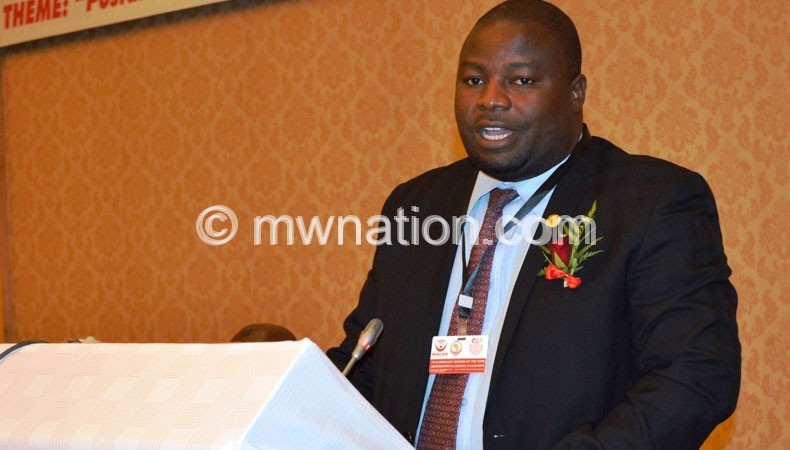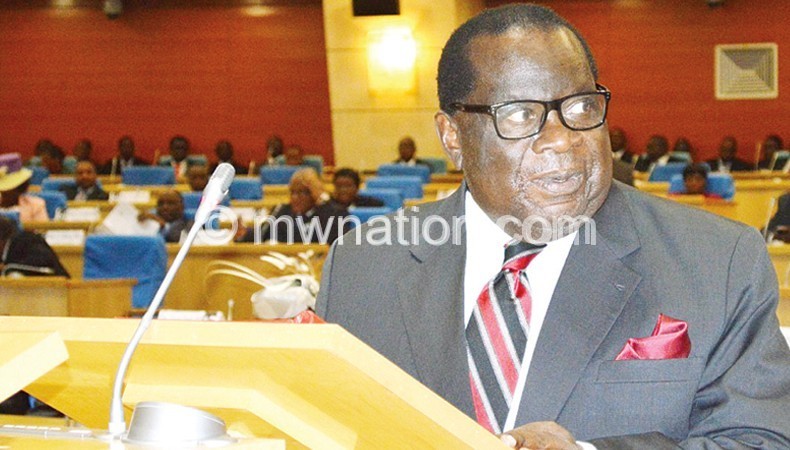Nankhumwa cautions Goodall on SMS tax
Minister of Information Kondwani Nankhumwa has cautioned his colleague at Finance that the new tax on telecommunications services would negatively affect the economy and defeat the drive of making telecommunications services affordable.
In a letter addressed to Goodall Gondwe dated May 28 2015 that Nation on Sunday has seen, Nankhumwa fears the newly-introduced 10 percent excise duty on text messaging and Internet data would largely affect poor Malawians.

In the 2015/16 National Budget the Finance Minister presented in Parliament on May 29 2015, government imposed a 10 percent excise duty on text messaging and Internet data.
Some players in the telecommunications sector, notably Airtel and TNM, as feared by Nankhumwa in his letter to the Finance Minister—written a day after the budget presentation in the House—indeed increased tariffs almost immediately.
Nankhumwa, when contacted, confirmed authoring the letter, but said he would not comment on it because the communication was not meant for public consumption.
And when asked for his reaction to concerns raised by his Cabinet colleague, Gondwe said he could not comment on issues confidentially communicated to him.
But Nankhumwa in the letter said in a sector which already has a number of taxes, telecommunications operators were likely to transfer the imposed taxes on the provision of the services to the end users.
Nankhumwa writes: “Analytical research demonstrates that the telecommunications/ICT sector tax revenues play an important role in national public services.

“This role must be weighed against potentially adverse effects that the taxation can bring to the growth of the sector, broadband penetration and the country’s economic growth.”
The minister said the proposed taxes on usage and consumption taxes would have a negative impact on the poor Malawians as subscribers would have to pay for the same access charge as the better off Malawians who would also pay more for usage on the same services.
Nankhumwa tells Gondwe: “If no taxes are imposed, the net effect from the increased volumes [assuming a 10 percent growth subscriber base and volume of data similar to 2014 rates at same tariffs prevailing currently] will be compensated by an increase in operators’ corporate income tax and the existing consumption rates at the current prevailing rates.
“The spillover effect to other sectors that rely on telecommunication/ICT services for their productivity may also affect potential income in the long run.”
Nankhumwa’s concerns to Gondwe expose a coordination gulf within the administration.
It also puts into question whether Cabinet really scrutinises the budget—as required—before giving approval to the Minister of Finance to table it before the National Assembly.
Some observers agree
Consumers Association of Malawi (Cama) executive director John Kapito said it is clear there is no coordination among ministries because what the Information Minister raised to his colleague should have been brought to his attention before the budget was presented in Parliament.
Kapito said: “Before budget is brought to Parliament, Cabinet meets to approve the budget. It should have been at this point that they were supposed to caution each other and not now.
“Are they telling us there wasn’t this process where they met to approve this budget? This is interesting and raises questions about the seriousness of this administration.”
Meanwhile, the Malawi Communications and Regulations Authority (Macra) said in an interview on Friday that it wrote government, through Ministry of Finance, raising fears of the negative impact the new tax would cause to the development of information and communication technology (ICT) in the country.
Macra director general Andrew Kumbatira said it was unfortunate to introduce a tax on text messaging and Internet data when countries in the region are fighting hard to lower taxes in the telecommunications sector as a way of facilitating economic growth.
Kapito, however, said with the cost of doing business in the country already high due to high tariffs in the telecommunications sector, the new tax on text messaging and Internet data would worsen the situation and drag the nation back.
Kapito said: “Almost all businesses are dependent on telecommunication and it has proved to be not cheap. Heads of State in the Sadc region actually signed a declaration to lower the rates.”
Heads of State in the Sadc region in August 2001 at their summit in Blantyre, in recognising that the community needs a coherent regional policy and strategy on ICT that promotes sustainable economic development, technology and bridges the digital divide within the region, committed themselves and their respective countries to removing trade barriers and reducing ICT related taxes and tariffs.
According to the 2014 ITU report, the cost of using a mobile phone in Malawi averaged about $12.67 (about K6 335) per month in 2013, about 56.29 percent of what an average Malawian earns.
The ITU ranked Malawi as the worst situation in the world out of 166 economies, a development which is influenced by the country’s poor income levels and the prohibitive cost of the services.
Relative to other economies in the region, according to the ITU report, Malawi customers on average use 30 percent of their income on mobile phones. In Zimbabwe it is at 26, Mozambique 18 percent, Zambia 14 percent, Kenya five while in Botswana it is at less than two percent.






Very interesting and strange at the same time. But it is good that the Information Minister and MACRA both raised the issue with the minister. One, at times, wonders why we have pre-budget consultations in Malawi when at the end of the day what is taken on the board is contrary to what was proposed during consultations
I believe they discussed all this at the cabinet level. But the chairman of the meeting — one graffiti artist — was soundly asleep at the wheel. And these are the consequences ……
Too much andende jwambone syndrome. There is no way a budget can be tabled in parliament without the cabinet knowing what is in it. A Budget is what the government will do in the next year, all ministries, and you are telling me NO ministers knew what was in it?
I think this country really should be a federal state, this kind of political rhetoric nonsense is too much. How does a confidential memo get read by journalists before the recipient has even got it?
Muthalika said he will not tolerate such, he needs to do something about it.